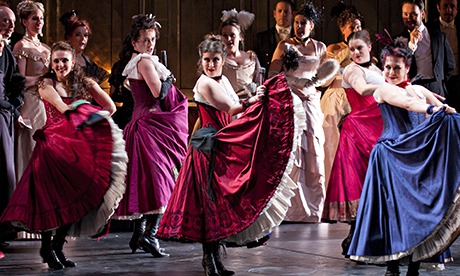Nineteenth-century literature is full of "fallen women". You can hardly move for them: Mimi. Violetta. Manon. Emma Bovary. The three works in Welsh National Opera's spring season – Manon Lescaut, Boulevard Solitude and La traviata – follow the stories of three women whose different paths in life lead them astray. We've called the season Fallen Women. The title itself is deliberately provocative. Where did they fall from and to? Did they jump or were they pushed? And why are there no fallen men?
The basic genre was a feature of all 19th-century media from magazines to novels, from theatre, to operas. It was both an indulgence and an admonition. It titillates as well as teaches, and it is inescapably tied up with the hypocrisy that springs from the historically unequal status of men and women. The men in the audience might be titillated by the first three acts of these operas – customarily devoted to the woman behaving badly – but could take their wives and daughters, safe in the knowledge that a stern moral lesson would be administered via the gruesome death of the heroine in the finale. If the titillation were sufficiently effective, the man could then say good night and go round to his "club", or more likely an establishment where a real "fallen woman" could be found.
But look closer and there are cracks in this seemingly impermeable hypocritical arrangement. These pieces also express the male fear of what a sexually empowered woman may be able to make them do; the admonishment is for men as well as women. Des Grieux, in Puccini's Manon Lescaut, is so besotted by Manon that he becomes a murderer and a thief in order to possess her. French literature of the period was as fascinated by the figure of the fallen seminarian as by the fallen woman. Des Grieux was destined for the church, as was Don José, who is equally driven by his craving for Carmen to become a deserter and a murderer, so he could – and does – fall (whereas Carmen, like Lulu in Alban Berg's opera, cannot because she does not recognise a moral imperative in the first place). In Massenet's Thaïs, the monk Athanaël attempts to teach the courtesan Christianity, but only ends up himself learning lust.
Hans Werner Henze's retelling of the Manon story in a 20th-century context, Boulevard Solitude, offers a less romantic view of sex workers. The terminology changes. Instead of courtesans and ballrooms, we have hookers and dens; cocaine rather than champagne; pimping, grooming and trafficking. The musical language of debauchery for Verdi was the waltz (La traviata is framed by two waltz duets at the beginning and the end), whereas for Henze it is jazz.
Puccini's Manon and Verdi's Violetta start at opposite ends of the fall. Manon is on her way to a convent, possibly as a result of bad behaviour. She's no angel: she "jumps" (rather than falls), and is snapped up by the obsessed student Des Grieux, although the wealthy roué Geronte is never far behind. Her conduct is erratic, headstrong and wild, but she is, essentially, an amateur playing out of her depth, and she is quickly crushed. La traviata (literally "she who strayed from the path") by contrast, begins with the courtesan Violetta at the height of her social and professional success. Violetta had begun by being trafficked – as do many young women today – and arrived in Paris as an unlettered country girl. She has built a disciplined empire based on sex, style and sophistication; her trajectory in contrast to Manon's precipitate fall is an inexorable rise. She is probably as near to being a woman of power, in charge of her own destiny, as it was possible for any woman of that era to be.
How common was it for such women to establish independent means and retire? There is a telling scene in Zola's novel about the prostitute, Nana, where she is out on a picnic and passes the grand gates to the property of some retired "Grande horizontale". The hushed reverence that this evokes indicates its rarity. Puccini's La bohème features two "fallen women": the fragile, sickly Mimì and the exuberantly robust Musetta, again characterised by that epitome of flaunted sexual power, the waltz. The real-life Musetta, subject of one of the first ever nude photographs by Nadar, did in fact manage to save a small fortune, but didn't get to enjoy it; she drowned on her way to retirement in Algeria.
In Violetta's case, an element beyond her control enters the equation: illness. Illness brings death, and death brings reflection, remorse, religion. Violetta starts to behave unprofessionally: she falls in love. If "love", or its physical expression, is what you are selling, you can't afford to give it away for free, any more than you can afford to have moral scruples about sex. In Dumas's novel on which Verdi's opera is based, Violetta is given a copy of the novel Manon Lescaut. She reads it with great attention, perhaps disapproving of Manon's capricious cruelty. But her own "unprofessional" state of being in love, and the sense of her impending death, allows her lover's father, Germont, to exploit her vulnerability and morally blackmail her into giving up his son. This father figure plays upon her yearning for redemption in the face of death, but the irony is that throughout this scene we are acutely conscious that Germont might equally have been another of her clients. At the end of the opera, Germont's "fall" is to recognise the ambiguity of his own position.
• Manon Lescaut, Boulevard Solitude and La traviata are touring across Wales and England from 8 Feb – 12 April. Details: wno.org.uk






